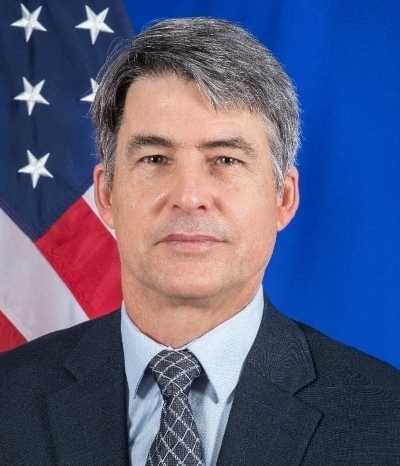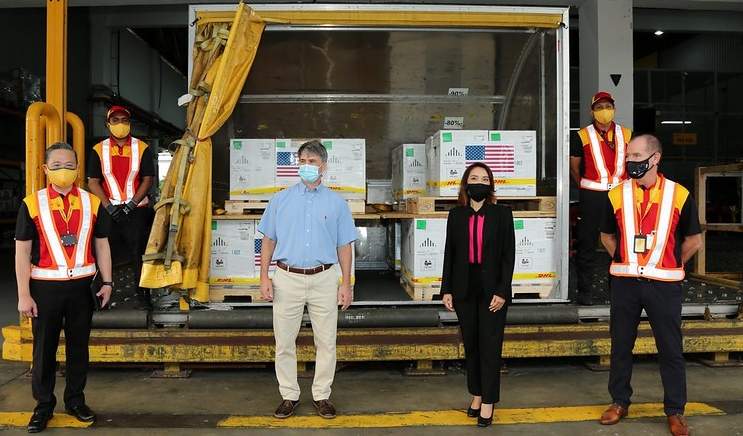
By Brian McFeeters
I am proud to share that the United States of America delivered a donation of one million doses of the Pfizer-BioNTech vaccine to Malaysia on July 5th as part of our global effort to end the COVID-19 pandemic. Our number one priority is to save lives, and we hope that this contribution will support the Malaysian government's National Immunization Program and help the Malaysian people achieve recovery as quickly as possible.
COVID-19 may have radically changed our lives, but it has also proven the power of solidarity and collective action in defeating the pandemic. As cases continue to surge in different regions and new variants emerge, the United States recognizes that ending the pandemic means ending it everywhere.
The United States is working with partners globally to help countries obtain more equitable access to vaccines, accelerate vaccinations worldwide, and achieve global herd immunity. We are harnessing the power of our democracy, the ingenuity of our American scientists, and the strength of our manufacturing to beat the pandemic globally. As President Biden said, "America will be the arsenal of vaccines in our fight against COVID-19, just as America was the arsenal of democracy during World War II."
We have made a landmark pledge to provide 500 million additional Pfizer vaccine doses to the world's lowest-income nations via COVAX. The United States is the top financial donor to COVAX with a USD $4 billion pledge to be fulfilled over the next two years. Through platforms like COVAX and the G7, we hope to inspire other countries to make similar pledges; we will continue coordinating efforts by the world's democracies to speed up vaccine production and availability globally, including through the Quad initiative.
As the global vaccination drive forges ahead, we remain committed to working with partners in Malaysia to provide immediate COVID relief beyond vaccines. To date, the United States government has donated over USD $2 million to boost Malaysia's capacity in responding to the pandemic. Funds have been channelled to purchase COVID-19 testing supplies and protective gear for frontline workers, and to assist refugee communities in Malaysia.

The United States government is not alone in partnering with Malaysia to defeat the pandemic. The American business community's strong network with, and support for, local communities has amplified the reach and impact of its COVID-19 relief contributions. Under the MyAmCham Cares program, the American-Malaysian Chamber of Commerce is coordinating the ongoing efforts of nearly 50 U.S. companies and has raised over RM7 million and a host of in-kind donations since early last year.
Beyond immediate COVID-19 vaccination and relief efforts, we must continue our long-term partnership and look toward the future. As Secretary Blinken has said, "Our challenges now are two: first, to shorten the lifespan of a borderless pandemic that is destroying lives and livelihoods all over the world, and the second is to ensure that we can prevent, detect, and respond to those future global health threats we know are coming." To accomplish this, research, knowledge-sharing, and education are key.
The United States has been advancing global health security strategically for more than a decade under the Emerging Pandemic Threat (EPT) program. Through EPT, we have funded research to better detect, understand, and predict disease emergence from wildlife in East Malaysia. This effort identified 76 novel viruses, subsequently providing the Malaysian government with actionable data to mitigate the risks from zoonotic diseases.
Looking ahead, the Biden administration is working hard to ensure global preparedness for future pandemics and disease outbreaks by proposing the establishment of a National Center for Epidemic Forecasting and Outbreak Analytics. The Center will modernize early warning systems and give the global community more time to respond to public health threats. As United States Ambassador to Malaysia, I am committed to expanding bilateral research and institutional cooperation that will enhance readiness for future outbreaks.
Even further ahead, it is essential that we continue to equip young people with knowledge, skills, and interest in science, technology, engineering and math (STEM). Today's youth will be tomorrow's researchers, achieving scientific breakthroughs that will help counter future pandemics. The U.S. Embassy's "Virus Hunter" campaign features an interactive website (www.virushunterexhibit.com) and virtual workshops designed to increase young people's awareness about combating infectious diseases, expose students to STEM career pathways, and enhance their ability to identify pandemic misinformation. We want all our children to have the best opportunities in the future. Equipping them with the tools for the next generation's fight against pandemics is a step in the right direction.
Health is a human right and a shared responsibility. As part of our overall close relationship, we will continue working with Malaysia as a trusted partner to overcome the COVID-19 pandemic, and the United States will work globally to prevent future pandemics.
(Brian McFeeters is the United States Ambassador to Malaysia.)
ADVERTISEMENT
ADVERTISEMENT


































